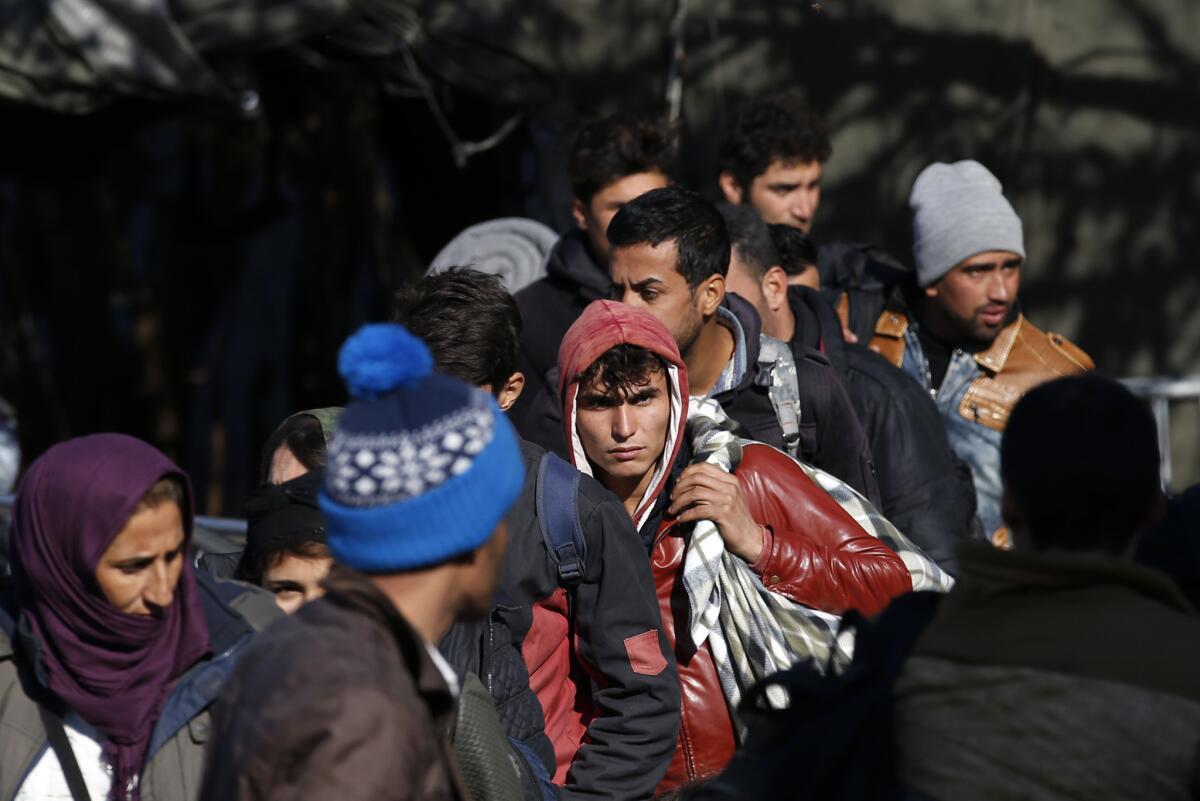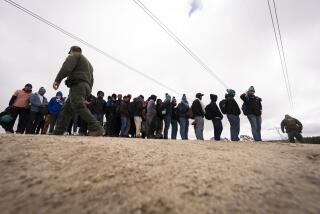Syrian refugee debate draws comparisons to Holocaust

Syrian migrants wait to register with the police at the refugee center in the southern Serbian town of Presevo.
The debate over whether the U.S. government should continue to admit migrants from Syria following last week’s terrorist attacks in Paris has drawn comparisons to the Holocaust from leaders of local cultural organizations that focus on human rights and other international issues.
But some cautioned that the U.S. faces an unprecedented threat from Islamic State, and said that they support implementing tough screening measures for those coming from the war-torn country.
“Jews are the first ones who should be sympathetic to refugees. We know the story of the Holocaust,” said Rabbi Marvin Hier, founder and dean of the Los Angeles-based Simon Wiesenthal Center and the Museum of Tolerance, in an interview.
During World War II, the U.S. refused entry to many European Jews seeking refuge from Nazi forces.
He added: “In this case, we have a very serious national security issue, which we did not face during the 1930s when the Jews were trying to get out of Europe. We didn’t have terrorists blowing themselves up.”
As of Wednesday, about two dozen state governors have said they oppose admitting additional refugees from Syria, with some citing concern that Islamic State terrorists could infiltrate the U.S. as they are believed to have done in France.
Their opposition has been blasted by President Obama as “offensive and hysterical.” Meanwhile, House Speaker Paul D. Ryan has called for a “pause” in Syrian refugees coming to the U.S.
The federal government, not the states, ultimately decides on matters of immigration.
Islamic State militants have claimed responsibility for the Paris terrorist attacks, in which 129 people were killed in and around the French capital. Since Friday’s massacre, Islamic State has threatened to carry out attacks in Washington and New York.
The refugee debate has divided U.S. political leaders on issues of compassion versus national security. It is estimated that 9 million Syrians have fled since war broke out in the country in 2011.
Hier said he believes that “no one should be admitted to [the U.S.] without very serious security checks. ... The only defense is intelligence -- otherwise we place ourselves in great peril. When we do something good, we don’t want to do something bad at the same time.”
During World War II, some U.S. politicians feared enemy spies would infiltrate the country if Jewish refugees were allowed in.
“Obviously, many Americans in 1943 felt the same as many do today -- that we cannot risk admitting enemy agents among the throng of refugees,” said E. Randol Schoenberg, president of the L.A. Museum of the Holocaust.
“During World War II, this type of fear meant that millions of honest, innocent people were unable to escape their murderers. I hope we don’t make the same mistake again.”
Samara Hutman, executive director of the museum, is currently in Germany, where many Syrian migrants have sought asylum, and said she plans on visiting a refugee center in Munich.
She said in a statement that the evolving Syrian crisis “is very much present and palpable in the halls, offices and corridors of our museum.”
The potential backlash against Syrian immigrants is likely to play into the hands of the Islamic State, according to Jordan Elgrably, executive director of the L.A.-based Markaz, Arts Center for the Greater Middle East.
“They are openly hoping that Muslims who are discriminated against, even rejected as asylum seekers, will turn to Daesh,” he said, using an Arabic acronym for Islamic State.
The majority of Muslims in the West aren’t going to join up, he said, “but what are Britain, France and the U.S. doing to enfranchise Arab [and] Muslim youth -- if anything?”
Twitter: @DavidNgLAT
More to Read
The biggest entertainment stories
Get our big stories about Hollywood, film, television, music, arts, culture and more right in your inbox as soon as they publish.
You may occasionally receive promotional content from the Los Angeles Times.







